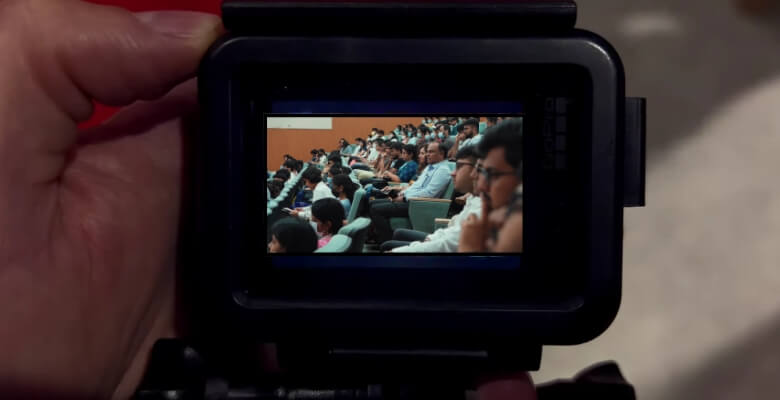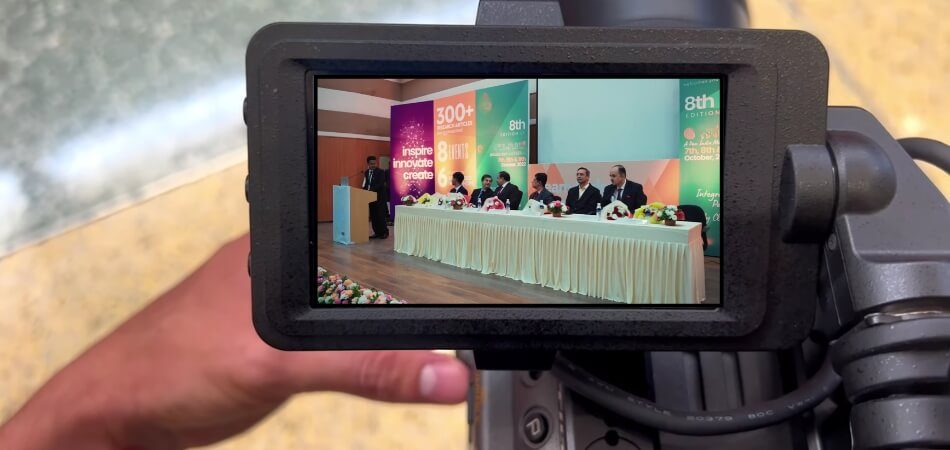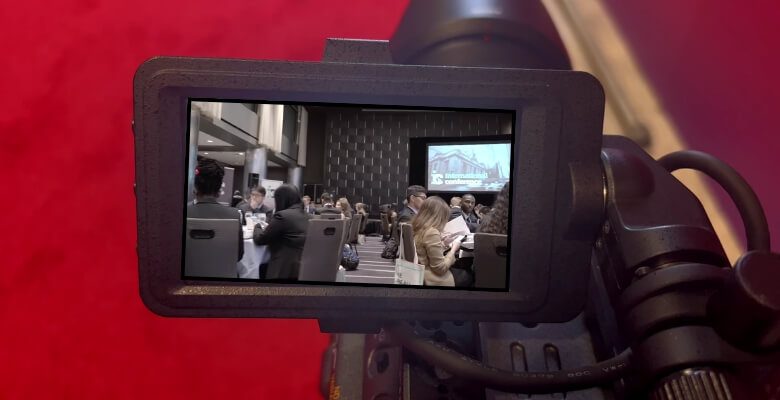Business conferences can be treasure troves of knowledge, networking, and inspiration, but often, it can be overwhelming to absorb everything during the sessions. You might find yourself wondering, “Can I Record Sessions at a Business Conference?” This question is crucial for ensuring you capture valuable insights without missing a beat.
In many cases, recording sessions is permitted, but it often depends on the specific conference’s policies. It’s always best to check with the organizers beforehand, as they may have guidelines or restrictions in place to protect speakers’ intellectual property and maintain a respectful environment.
Getting to know the rules around recording can help you manage these events more effectively. Continue reading to discover tips on how to ensure you get the most out of your conference experience while respecting the rights of presenters and attendees alike.
Importance of Preserving Business Conference Moments
Preserving business conference moments is crucial for future reference and professional growth. Attendees capture insights that develop their skills and knowledge. In particular, Canadian conferences provide vibrant networking opportunities, creating connections that drive innovation.
By documenting these moments, you create a resource for revisiting key takeaways and strategies of an international business conference you have participated previously. Moreover, most upcoming business events in Canada promise even more learning and collaboration. These events are a goldmine for fresh ideas and industry trends.
Sharing experiences from past conferences can inspire others and highlight the value of continued participation. Preserving these moments helps in building a stronger, more informed professional community. This practice ensures continuous improvement and adaptation in an ever-evolving business landscape.
Can I Record Sessions at a Business Conference?
Yes, you can usually record sessions at a business conference, but you should check the guidelines provided by conference organizers first. The guidelines help protect the rights of speakers and participants, ensuring that content is shared ethically and legally. Keeping these rules in mind also ensures conference integrity.
Obtaining permission to record a presentation can be a great way to capture useful insights. You can revisit the recorded content at your convenience, which is beneficial for absorbing complex information at your own pace. This is particularly useful for attendees who wish to apply learned strategies and ideas within their professional contexts.
Keep in mind that even if someone permits you, it is still important to respect and consider their privacy. Always secure explicit consent from speakers and fellow attendees before sharing recordings publicly. By using recordings responsibly, you make sure they serve as educational tools and respect the presenters’ intellectual property.
What Are the Benefits of Recording Business Conference Sessions?
Professionals seeking growth and knowledge can benefit from attending business conferences. The sessions at a business conference are even better if they are recorded. Recording sessions will help in assessing the value of conferences for your business and create planning for joining future business events. Below are some key benefits of recording business conference sessions.
Improved Learning Opportunities
A recording allows attendees to review complex topics at their own pace. This aids in better knowledge and retention of information. Attendees can pause, rewind, and replay key segments. It helps clarify points that were initially difficult to grasp.
Resource Sharing
Recorded sessions can be shared with team members who couldn’t attend. This helps you share knowledge across your organization. It also encourages a culture of learning and continuous improvement.
Long-Term Accessibility
Conference talks can be preserved in a digital archive for long periods. You can use these recordings for future training and development. They also function as a valuable resource for onboarding new employees.
Increased Engagement
Recorded content is more appreciated when attendees understand the purpose of holding business conferences. Those who missed certain parts can catch up later. This prevents critical information from being missed and leads to better engagement.
Professional Development
Analyzing recorded sessions can reveal personal growth opportunities. It allows individuals to focus on topics relevant to their career path. Personalized learning is more effective and personally beneficial. It directly contributes to professional advancement.
Cost-Effective Learning
Attending every interesting session live can be impossible due to scheduling conflicts. With recordings, you won’t miss out on overlapping sessions. You get full value from your conference investment. This makes learning and participation more cost-effective.
How to Get Permission to Record a Session at a Business Conference?
A recording of a business conference session can help you learn more, allowing you to review it later. However, permission is necessary to protect intellectual property and participant privacy. The following steps can assist you in securing the right to record sessions.
Step 1: Check Conference Guidelines
You can check the official conference materials or website for any recording policies. These guidelines usually specify if recording is allowed or what conditions apply. If the policy isn’t clear, it’s important to seek further clarification. Without explicit permission, never assume recording.
Step 2: Contact Conference Organizers
Ask the conference organizers directly for permission if the guidelines do not permit recording. Use the official contact information provided in the conference materials. Explain your intent and how you plan to use the recordings. By being upfront and professional, you can improve your chances of securing approvals.
Step 3: Request Written Permission
Once verbal approval is given, ask for permission in writing to avoid misunderstandings. An email or a formal letter can serve as sufficient documentation. Your recording rights should be outlined in this written confirmation. This is an essential record for both parties.
Step 4: Respect the Speaker and Participant’s Privacy
Always inform speakers and participants that you have permission to record. This courtesy gives them the option of opting out if they don’t want to be recorded. Keeping your privacy isn’t just good for building trust, it’s ethical too. Try to share the recordings with the speakers as a gesture of goodwill.
Step 5: Adhere to Copyright Laws
Be aware of copyright laws for recorded content. Don’t share recordings or redistribute them without permission. It’s especially important if you plan to use them for more than just personal use.
Tips for Ethical Recording Practices at a Business Conference
Conference recordings are great for personal learning and sharing insights with your team. However, you need to handle it responsibly to maintain professional standards. Find out if a business conference is legitimate and seek permission to record sessions. Renowned conferences offer the opportunity to record their sessions for post-assessment of the conference value. Here’s how you can make your recording practices both respectful and legal.
- Ask for Consent: Be sure to obtain the explicit consent of speakers and participants before recording. This contributes to a respectful and transparent environment.
- Avoid Sensitive Areas: Avoid recording in occupied private areas like lounges or dining areas where people expect privacy.
- Keep Recordings Secure: Safeguard your recordings to prevent unauthorized access and distribution, especially when handling sensitive information that requires confidentiality.
- Limit Scope of Use: Clearly define how the recordings will be used, such as for personal review or team training only. By setting boundaries, you protect the integrity of the content.
- Respect Cultural Norms: Be mindful of cultural sensitivities and adjust your recording practices accordingly. Being aware of a variety of perspectives can prevent conflicts.
- Edit Responsibly: When editing recordings, make sure not to alter the original message or context. By editing ethically, the speaker’s intended message is maintained.
- Review Regularly: Maintain legal and ethical compliance by periodically reviewing your recording practices. Adaptation is key to maintaining responsible practices.
Frequently Asked Questions
Below you will find a list of FAQs and their relevant answers so that you can get a clear and detailed idea of this query, “Can I record sessions at a business conference?”
Is It Legal to Screen-Record a Meeting?
Screen recording involves capturing visual content, which can be protected by copyright. To avoid potential legal consequences, you must obtain permission before recording sessions.
What Should I Do if I Forget to Ask for Permission Before Recording?
If permission was not obtained beforehand, stop recording immediately. Delete any unauthorized recordings to avoid legal and ethical issues related to privacy and intellectual property.
How Should I Store Recorded Sessions Securely?
Store recordings in encrypted and password-protected files or secure cloud storage. This prevents unauthorized access and protects sensitive conference content from being compromised.
Is There a Time Limit for Recording Sessions?
Some conference organizers may restrict the length of recording sessions, especially during sensitive discussions or workshops. Be sure to verify any time constraints with the organizers to avoid disruptions.
What Should I Do if I Encounter Technical Difficulties During Recording?
If technical issues arise during recording, such as equipment malfunctions, notify conference staff promptly. They may provide assistance or alternative solutions to ensure minimal disruption.
Are There Guidelines for Recording Q&A Sessions or Audience Interactions?
Recording Q&A sessions or audience interactions may involve participant consent and moderator approval. Ensure all participants are informed and comfortable with being recorded.
Conclusion
The recordings from a business conference can increase your learning experience and provide insights for your team. However, always check conference policies and obtain explicit permissions to respect privacy and intellectual property rights.
Addressing the question, “Can I record sessions at a business conference?” we found that while it is often permitted, there are strict guidelines that must be followed. The act of recording responsibly results in capturing valuable information ethically and fostering a culture of learning and respect.
Be sure to handle recordings securely, inform all participants, and pay attention to copyright laws to maintain professionalism. By following these practices, you can maximize conference recording benefits while maintaining integrity and respect for everyone involved.








